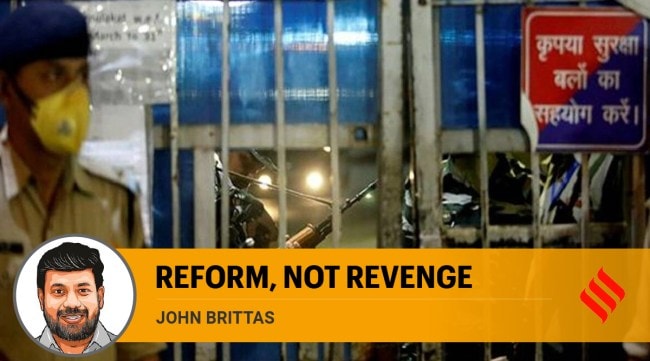Opinion Delhi LG has got it wrong, India doesn’t need new prisons — it needs prison reform
John Brittas writes: The criminal justice system, marked by bias against the underprivileged and violation of prisoners’ rights, must be overhauled. Listen to President Murmu’s speech once again, where she made an earnest appeal to liberalise the bail system
 John Brittas writes: Data from the Prison Statistics of India 2021 report of the National Crime Records Bureau show that more than 77 per cent of jail inmates are undertrials and every year this number goes up. (Representational image/Express)
John Brittas writes: Data from the Prison Statistics of India 2021 report of the National Crime Records Bureau show that more than 77 per cent of jail inmates are undertrials and every year this number goes up. (Representational image/Express) Bengaluru-based Shankar Mishra, whom the media has christened as “The Urinator” following his disgusting act of peeing on an elderly female passenger in the business class section of an Air India flight, is now lodged in a Delhi jail. For prison authorities there, it is one of those few occasions when an upper-caste man is walking in as an inmate. Enough data suggests that the criminal justice system is inherently biased against disadvantaged sections. Data of those behind bars may shock you — or maybe it won’t. It is as follows: SC 20.9 per cent, ST 11.24 per cent, OBC 35.06 per cent, Muslims around 20 per cent, Christians around 2.47 per cent, Sikhs around 3.24 per cent, etc. In fact, if an alien were to walk into an Indian jail, it would decipher from available data that upper castes in general do not display substantive criminal behaviour.
These insightful statistics should inspire earnest enquiries in any sane society. But in India, instead of finding reasons, we have come up with a solution: Build more prisons, and build them bigger!
Delhi Lieutenant Governor Vinai Kumar Saxena recently asked the Delhi Development Authority to allocate 1.6 lakh square metres of land to build a new prison complex on the outskirts of the national capital. One wonders whether he ever heard President Droupadi Murmu speak at the Constitution Day celebration organised by the Supreme Court in November 2022, a few kilometres away from Saxena’s Raj Niwas. “I hear these days that we will have to make new prisons because prisons are overcrowded. If we are moving towards progress as a society, then why do we need new jails? We should be closing down the existing ones,” she has said. With precision, the president underlined the fact that the wheels of justice hardly move for the poor and marginalised in this country.
The president also addressed the single biggest reason why India’s prisons are full of those from disadvantaged sections: A huge chunk of them are incarcerated for minor offences but they languish in jails because their families cannot afford the cost of bail bonds or even litigation. In Satender Kumar Antil Vs. CBI (2022), the Supreme Court noted that “the majority [of undertrial prisoners] may not even be required to be arrested despite registration of a cognisable offence, being charged with offences punishable for seven years or less. They are not only poor and illiterate but also include women”.
Data from the Prison Statistics of India 2021 report of the National Crime Records Bureau show that more than 77 per cent of jail inmates are undertrials and every year this number goes up. The undertrial prisoners in Indian jails registered a 15 per cent increase from 3.72 lakh in 2020 to 4.27 lakh in 2021. The same data set also records 25 per cent of this prisoner population as being illiterate. In the absence of data on the economic standing of prisoners, education level and social backgrounds can be used for measuring the degree of backwardness and vulnerability.
The Supreme Court has outlined three broad principles regarding imprisonment and custody. First, a person in prison does not become a non-person. Second, a person in prison is entitled to all human rights within the limitations of imprisonment. Third, there is no justification for aggravating the suffering already inherent in the process of incarceration. Section 436A of the CrPC stipulates that a person having undergone detention for half as much time as the maximum period of imprisonment for the alleged offence, except where the punishment of death hasn’t been specified as one of the punishments, is entitled to be released on bail with or without sureties. In Hussain and Anr. v/s Union of India (2017), the apex court had ordered expeditious disposal of bail applications along the principle of bail being the norm and jail being the exception.
Yet, India, the world’s largest democracy, is one of the few countries to have instituted a blanket ban on the voting rights of prisoners. During the Constituent Assembly Debates of 1946-49, one of the few proposals that were agreed upon through near-unanimous consensus was Universal Adult Franchise. We recognised the significance of choosing one’s own representatives as far back as before Independence. But 75 years later, the Representation of People Act, 1951 prohibits anyone confined in a prison from exercising the most fundamental civil liberty of voting.
This includes incarcerated prisoners as well as undertrials — the latter neither convicted nor acquitted but simply placed in jail, living from one hearing to the next. The ban lacks any reasonable classification based on the nature of the crime or duration of the sentence as in other countries such as South Africa, Germany, France, Canada, etc. Undertrials who are out on bail, even in non-bailable offences, can enjoy the right to vote. This is a flagrant violation of Articles 14 and 21 of the Constitution. This gross injustice should stare at us when the Election Commission is devising means to ensure remote voting.
The number of custodial deaths has registered a 12 per cent increase from 1,887 in 2020 to 2,116 in 2021. On December 31, 2021, the sanctioned strength of medical staff was 3,497 while the actual strength was 2,080. Instances of manual scavenging inside prisons have also been reported in the media. They are still governed by the colonial Prisons Act, 1894, which treats prisoners as sub-par citizens and provides for strict punishment rather than rehabilitation.
The criminal justice system is based on four pillars — deterrence, retribution, prevention, and reformation. Knowingly or unknowingly, ours seems to be inclined towards seeking revenge from those charged with punishable offences. And moreover, the inherent bias in the system against the underprivileged is too stark for anyone to miss it.
It makes enormous sense to listen to President Murmu’s speech once again, where she made an earnest appeal to liberalise the bail system, as had also been suggested in the 268th Report of the Law Commission of India.
The writer is a Rajya Sabha member



